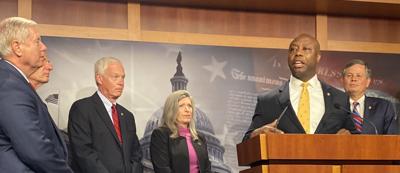U.S. Sen. Tim Scott's signature effort — bipartisan police reform — appears to have died for good, falling apart on Capitol Hill after a string of missed deadlines and messages of optimism that both sides could strike a deal.
Scott, R-S.C., spent months working on a legislative fix along with Democratic U.S. Sen. Cory Booker of New Jersey, but their tone of optimism faded when Booker abruptly issued a statement Sept. 22 saying the talks were finished.
"Unfortunately, even with this law enforcement support and further compromises we offered, there was still too wide a gulf with our negotiating partners and we faced significant obstacles to securing a bipartisan deal," he said.
Scott blamed Democrats for the collapse.
"After months of making progress, I am deeply disappointed that Democrats have once again squandered a crucial opportunity to implement meaningful reform to make our neighborhoods safer and mend the tenuous relationship between law enforcement and communities of color," he said. "Crime will continue to increase while safety decreases, and more officers are going to walk away from the force because my negotiating partners walked away from the table."
A key sticking point identified early on in their talks was the issue of qualified immunity, the legal doctrine that shields police officers from being sued. Democrats want to do away with it and Republicans want to keep it in place. Lawmakers targeted reforming the nation’s law enforcement systems after a series of police-involved deaths sparked widespread protests and a nationwide dialogue on social justice.
As the lone Black Republican in the Senate, Scott was seen as the GOP point man for any bipartisan effort on the federal response and a necessary voice to break the gridlock in Washington and pass reforms.
President Joe Biden originally wanted to be able to announce a deal on widespread police reform legislation by May 25, the one-year anniversary of George Floyd’s murder in Minnesota. Scott has previously told reporters it was “June or bust” to get the bill across the finish line. That didn't happen, but by July, Scott continued to express optimism that progress was being made.
“Unlike fine wine, this does not get better with time,” Scott told The Post and Courier at the time. “We have to have an agreement in place (by the August recess) or I do think this is over.”
In early August, The Post and Courier reached out to Scott's office to ask about the looming deadline ahead of the recess and did not receive a response about what progress was being made.
Booker's Sept. 22 declaration that reforms couldn't be reached is a stark contrast to what the New Jersey Democrat told The Post and Courier in July. The two African American lawmakers had partnered in the past on issues like “opportunity zone” tax incentives, criminal justice reform, and boosting funding for sickle cell research and historically Black colleges and universities.
“In general, Tim Scott and I have gotten a lot of good things done for America together,” Booker said. “Right now, we’re locked in very important negotiations. I can’t tell you what the outcome will be. But I have to just point to our record of accomplishing difficult things in an environment in Washington that’s known for not getting things done.”
Booker's Sept. 22 statement said he has not exhausted other avenues to pass policing reforms.
“The time has come to explore all other options to achieve meaningful and common sense policing reform," Booker said in a statement. "I will not stop fighting until we achieve change that keeps our communities and police officers safe.”
Scott's message concentrated on what could have been.
"The areas where we agreed — banning chokeholds, limiting the transfer of military equipment, increased mental health resources, and more — would have brought justice to these families," he said. "I’ve also heard from police and sheriffs groups who supported the work we were doing to provide more resources to implement better training, standards, and accountability for departments."
He added, "Despite having plenty of agreement, Democrats said no because they could not let go of their push to defund our law enforcement. Once again, the Left let their misguided idea of perfect be the enemy of good, impactful legislation."
Scott's profile has been rising, and after several national TV appearances he has raised $9.6 million in the second quarter of 2021, putting him at the front of the financial pack among senators across the country facing re-election next year.
He faces two Democratic challengers in 2022: state Rep. Krystle Matthews of Ladson and Spartanburg County Democratic Party Chairwoman Angela Geter.
Matthews said compromise on some issues in police reform wouldn't have give the bill any teeth. She took aim at Scott for trying to debate some of the Democrats' main points.
“Any so-called Justice Reform bill that doesn’t address qualified immunity, ignores the militarization of our police and fails to ban chokeholds and no-knock warrants, is just dodging the tough questions," Matthews said. "It’s like trying to make an apple pie without the apples and then pretending we don’t know the difference."
Geter did not immediately return a request for comment.










